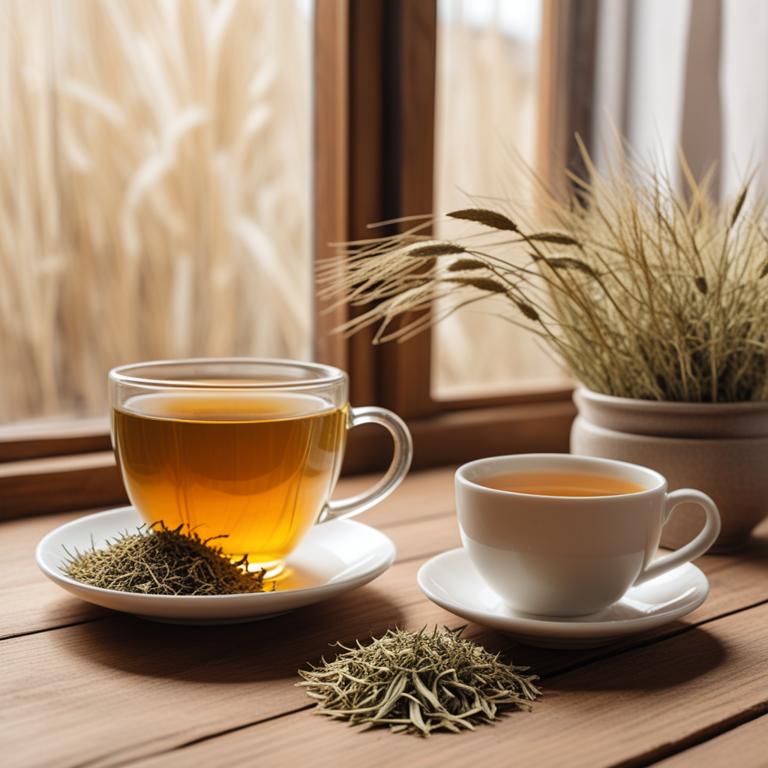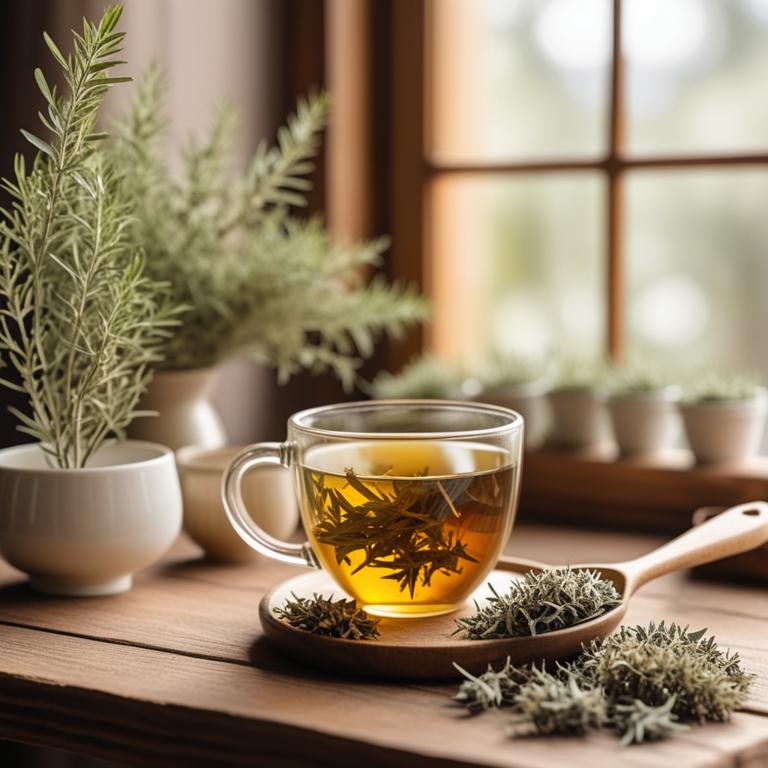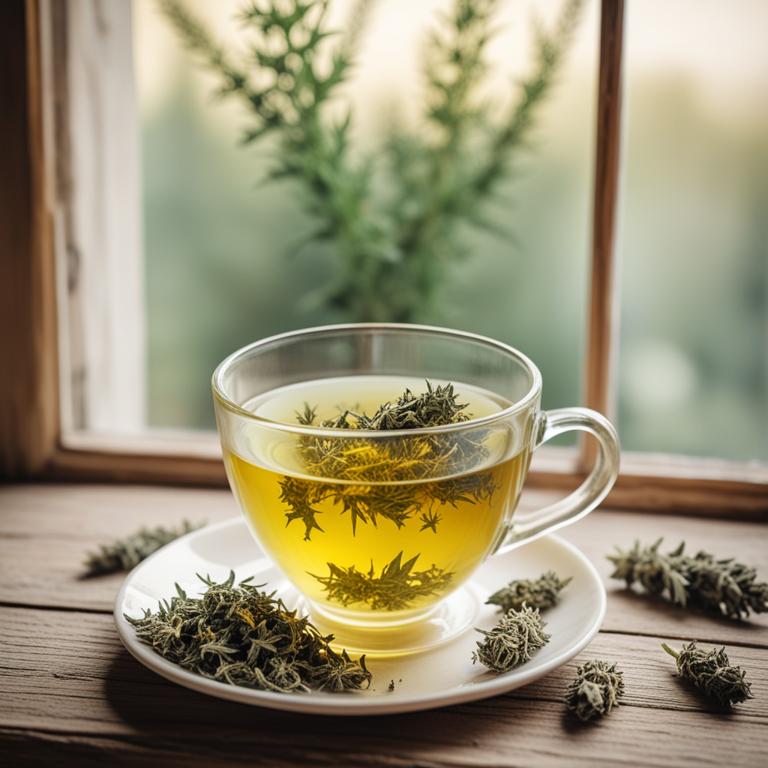9 Herbal Teas For Foot Odor

Herbal teas can be a simple and effective way to relieve foot odor.
Foot odor is caused by the growth of bacteria on your skin, which feeds on sweat and produces a strong smell. Certain herbs, like Eucalyptus globulus, have natural antibacterial properties that can help prevent the growth of these bacteria. When you soak your feet in a warm bath infused with Eucalyptus globulus, its oils can penetrate deep into your skin and help kill the bacteria that cause odor.
Another herb, Cymbopogon citratus, also known as lemongrass, has a fresh and citrusy scent that can help mask unpleasant foot smells. Additionally, its antibacterial properties can help keep your feet fresh and clean. Melaleuca alternifolia, or tea tree oil, is another powerful herb that can help combat foot odor. Its antifungal and antibacterial properties can help prevent the growth of bacteria and fungi that cause foot odor.
By soaking your feet in a warm bath infused with these herbs, you can help keep your feet fresh and clean, and prevent embarrassing foot odor.
- 1. Eucalyptus globulus
- 2. Cymbopogon citratus
- 3. Melaleuca alternifolia
- 4. Lavandula angustifolia
- 5. Rosmarinus officinalis
- 6. Zingiber officinale
- 7. Thymus vulgaris
- 8. Artemisia absinthium
- 9. Echinacea purpurea
1. Eucalyptus globulus

Eucalyptus globulus teas contains compounds like eucalyptol, limonene, and alpha-pinene, which are responsible for its deodorizing properties.
Eucalyptol is a natural antifungal agent that helps to eliminate fungi that cause foot odor. Limonene has antimicrobial properties that help to reduce the growth of bacteria, while alpha-pinene helps to eliminate odor-causing compounds. By reducing the presence of fungi and bacteria, eucalyptus globulus teas can help to eliminate foot odor.
Drinking eucalyptus globulus tea may help to detoxify the body and improve circulation, which can also contribute to reducing foot odor.
- Boil 1 cup of water in a pot.
- Add 5-7 fresh or dried eucalyptus leaves to the boiling water.
- Reduce heat and let it simmer for 5-7 minutes.
- Strain the tea into a cup using a fine-mesh sieve or cheesecloth.
- Let the tea cool down, then soak your feet in it for 10-15 minutes.
2. Cymbopogon citratus

Cymbopogon citratus teas contains compounds like geraniol and limonene, which are known for their antifungal properties.
These properties help combat the fungus that causes foot odor by inhibiting its growth. The tea also contains citral, a natural antibacterial agent that reduces the presence of bacteria on the skin, which contributes to foot odor. Additionally, the tea's antiseptic properties help to dry out the skin, reducing moisture that can lead to fungal and bacterial growth.
By addressing the root causes of foot odor, Cymbopogon citratus teas can help to reduce the problem naturally.
- Gather 1 cup of fresh or dried Cymbopogon citratus leaves and 1 cup of water.
- In a pot, combine the Cymbopogon citratus leaves and water. Heat the mixture over medium heat.
- Let the mixture boil for 5-7 minutes, then turn off the heat and let it steep for 10 minutes.
- Strain the liquid into a separate container and discard the leaves. Let the liquid cool.
- Pour 1 cup of the cooled tea into a foot bath or a basin and soak your feet for 15-20 minutes.
3. Melaleuca alternifolia

Melaleuca alternifolia teas contains a high concentration of compounds like cineole and terpinen-4-ol, which are known for their antimicrobial properties.
These properties help to inhibit the growth of bacteria and fungi that can cause foot odor. The tea also contains compounds like limonene and alpha-pinene, which have antiseptic and antifungal effects, further reducing the risk of infection and odor-causing microorganisms. The antimicrobial properties of Melaleuca alternifolia tea help to create an environment that is less conducive to the growth of odor-causing bacteria and fungi, making it a potential solution for foot odor.
By reducing the presence of these microorganisms, the tea can help to minimize foot odor.
- Gather 2 tablespoons of dried Melaleuca alternifolia leaves.
- Heat 1 cup of water in a pot and bring it to a boil.
- Add the 2 tablespoons of Melaleuca alternifolia leaves to the boiling water.
- Reduce heat and let it simmer for 5-7 minutes.
- Strain the tea and let it cool before using it as a foot soak for 15-20 minutes to help reduce foot odor.
4. Lavandula angustifolia

Lavandula angustifolia teas contains active constituents like linalool and linalyl acetate, which have antimicrobial properties.
These properties help to reduce the growth of bacteria on the skin, which can cause foot odor. The antibacterial and antifungal properties of linalool and linalyl acetate can also help to eliminate fungal and bacterial infections that contribute to foot odor. Additionally, the deodorizing properties of these compounds can help to neutralize the smell of sweat and other compounds that contribute to foot odor.
Regular consumption of Lavandula angustifolia tea may also help to reduce sweating, which can further help to prevent foot odor.
- Gather 1 cup of dried Lavandula angustifolia flowers and 1 quart of boiling water.
- Steep the Lavandula flowers in boiling water for 5-7 minutes. Let it cool down.
- Strain the mixture using a cheesecloth or a fine-mesh sieve to remove the flowers.
- Combine the cooled tea with 1 tablespoon of apple cider vinegar in a bowl.
- Soak your feet in the tea mixture for 30 minutes, then rinse with warm water and dry.
5. Rosmarinus officinalis

Rosmarinus officinalis teas contains the bioactive constituents carnosic acid and rosmarinic acid.
These compounds have antimicrobial properties that help prevent the growth of bacteria that cause foot odor. Rosmarinus officinalis teas also has antifungal properties, which can inhibit the growth of fungi that contribute to foot odor. The antimicrobial and antifungal properties of rosmarinic acid and carnosic acid in Rosmarinus officinalis teas help to create an environment that is less conducive to the development of foot odor.
The compounds in Rosmarinus officinalis teas can also help to reduce moisture and kill bacteria on the skin, which can help to prevent foot odor.
- Gather 1 cup of fresh Rosmarinus officinalis leaves or 2 teaspoons of dried leaves.
- Heat 1 cup of water in a pot and bring it to a boil.
- Add the Rosmarinus officinalis leaves to the boiling water and reduce heat to a simmer.
- Let the mixture steep for 5-7 minutes, then strain the leaves from the water.
- Cool the tea and use it as a foot soak by mixing it with 1 cup of warm water. Soak your feet for 15-20 minutes to help reduce foot odor.
6. Zingiber officinale

Zingiber officinale teas contains compounds like gingerols and shogaols, which are responsible for its antimicrobial and anti-inflammatory properties.
These properties help to reduce the growth of bacteria on the skin, which can cause foot odor. The essential oils in ginger, specifically geraniol and linalool, have antimicrobial effects that inhibit the growth of odor-causing bacteria. Ginger also has antifungal properties, which can help to reduce fungal infections that contribute to foot odor.
By reducing bacterial and fungal growth, Zingiber officinale teas can help to alleviate foot odor and promote a healthier foot environment.
- Gather ingredients: 1 tsp of Zingiber officinale root powder and 1 cup of boiling water.
- Add 1 tsp of Zingiber officinale root powder to 1 cup of boiling water and stir well.
- Steep the mixture for 5-7 minutes to allow the roots to infuse into the water.
- Strain the tea into a cup and add honey or lemon to taste if needed.
- Drink 1 cup of the tea, 2-3 times a day, to help reduce foot odor.
Zingiber Officinale Tea on Amazon
FGO Organic Ginger Tea, 100 Count, Eco-Conscious Tea Bags, Caffeine Free, Packaging May Vary (Pack of 1)
Disclaimer: We earn a commission if you click this link and make a purchase at no additional cost to you.
7. Thymus vulgaris

Thymus vulgaris teas contains compounds like thymol, carvacrol, and borneol, which have antimicrobial properties.
These properties help to reduce the growth of bacteria on the skin, specifically those that cause foot odor. Thymol and carvacrol are especially effective against gram-positive bacteria, such as Staphylococcus and Micrococcus, which thrive in warm, moist environments like the feet. The antimicrobial properties of these compounds prevent the bacteria from breaking down sweat and causing the strong, unpleasant smell associated with foot odor.
By reducing the bacteria's growth, Thymus vulgaris teas helps to keep the feet fresh and odor-free.
- Gather 1 tablespoon of dried thyme leaves (Thymus vulgaris) and 1 cup of boiling water.
- Add thyme leaves to a cup and pour boiling water over them.
- Let it steep for 5-7 minutes to allow the thyme to release its properties.
- Strain the tea and discard the thyme leaves. Let it cool to room temperature.
- Soak your feet in the cooled thyme tea for 10-15 minutes to help reduce foot odor.
8. Artemisia absinthium

Artemisia absinthium teas contains thujone and artemisinin, two key bioactive constituents.
Thujone has antimicrobial properties that help reduce the growth of bacteria on the skin, such as Bifidobacterium and Staphylococcus, which cause foot odor. Artemisinin has antifungal properties that combat fungal infections like athlete's foot, which also contribute to foot odor. These properties in Artemisia absinthium teas help eliminate the causes of foot odor, promoting a fresher and healthier foot environment.
Regular use of Artemisia absinthium teas may help control foot odor by reducing bacterial and fungal growth.
- Gather 1 tablespoon of dried Artemisia absinthium leaves.
- Boil 1 cup of water in a pot.
- Add the dried leaves to the boiling water and let it steep for 5-7 minutes.
- Strain the tea into a separate container to remove the leaves.
- Soak your feet in the tea for 30 minutes to help reduce foot odor.
9. Echinacea purpurea

Echinacea purpurea teas contains several bioactive constituents that make it effective in addressing foot odor.
These constituents include alkylamides, glycosides, and phenolic acids, which work together to inhibit the growth of bacteria that cause foot odor. Alkylamides have antimicrobial properties that help to reduce the population of bacteria, such as Staphylococcus epidermidis and Corynebacterium, that thrive in warm, moist environments like the feet. The glycosides in Echinacea purpurea teas also exhibit antioxidant properties, which help to neutralize the compounds produced by bacteria that contribute to foot odor.
By reducing bacterial growth and neutralizing odor-causing compounds, Echinacea purpurea teas provides a natural solution to foot odor.
- Gather 2 tablespoons of dried Echinacea purpurea flowers and leaves.
- Add the dried flowers and leaves to 1 cup of boiling water.
- Reduce heat to low and let it steep for 5-7 minutes.
- Strain the tea into a separate container and discard the solids.
- Drink the tea 2-3 times a day, or as needed, to help reduce foot odor.